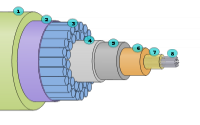Underseas Cables

Quicktabs: Keywords

The U.S. and its NATO allies have warned that an uptick in Russian submarine activity near undersea fiber optic cables means Moscow may be plotting to disrupt or intercept sensitive or other critical internet communications in the event of a confrontation with the West.
[ More ]
The author provides an overview of the existing international laws to protect underseas cables, the "networks of glass and steel that form the literal backbone of our internet."
[ More ]
Russian submarines and spy ships are aggressively operating near the vital undersea cables that carry almost all global Internet communications, raising concerns among some American military and intelligence officials that the Russians might be planning to attack those lines in times of tension or conflict.
[ More ]
The author argues that "[i]t’s time to pay attention to security for undersea cables—crucial to global communications and commerce, and vital to our national interests."
[ More ]“[S]ubmarine cables provide backbone international transmission facilities for the global internet, electronic commerce and other international voice and data communications services that are major drivers of the 21st Century global information-based economy….[I]t has never been more important to our U.S. economic infrastructure, and our participation in the global economy, to strengthen the protection and reliability of international submarine cables. The Law of the Sea Convention, particularly as assisted by the enforcement mechanisms available to parties under Article 297, is a critical element of this protection.”
Many people around the world believe that their emails and phone messages are being sent through satellites. They are mistaken because satellites account for less than 5%.1 Global telecommunications development began about 150 years ago with the first commercial international submarine cable, laid between Dover, England and Calais, France in 1850. In 1858, the first trans-Atlantic telegraph cable linked London with the new world, via Newfoundland.2 The 143 words transmitted in 10 hours, replaced a one-way dispatch that would have previously taken about 12 days.3
In the last 25 years, there has been a stunning growth in undersea cables because of the communications revolution triggered by the internet. Undersea cables account for 95% of the world’s international voice and data traffic (Military, Government, Emergency Response, Air Traffic Control, Subway, Rail, and Port Traffic).4 Financial markets utilize undersea cables to transfer trillions of dollars every day. In 2004 alone, nine million messages and approximately $7.4 trillion a day was traded on cables transmitting data between 208 countries.5 As a result, submarine (undersea) cables are vital infrastructure to the global economy and the world's communication system.
Douglas Burnett, a legal expert on undersea cables notes that international banking institutions process over $ 1 trillion dollars per day via undersea cables. Any disruptions of these cables would severely impact global banking. Indeed, Stephen Malphrus, Chief of Staff to Federal Reserve Chairman Ben Bernanke, recently noted, “When communication networks go down, the financial services sector does not grind to a halt, rather it snaps to a halt.6 Even though there are hundreds of cables crossing the global seabed, there are just not enough undersea communication network redundancies available to handle the vast amount of bandwidth needed to keep global banking transactions in check.
Destruction of submarine cables can cripple the world economy to include the global financial market and/or Department of Defense (DoD). An example which reflects the importance of this strategic communication capability took place on December 26, 2006, when a powerful earthquake off Southern Taiwan cut 9 cables and took 11 repair ships 49 days to restore. The earthquake affected Internet links, financial markets, banking, airline bookings and general communications in China, Hong Kong, India, Singapore, Taiwan, Japan and the Philippines.7 When a cable loses service, it has a definite, but difficult impact to the global financial sector. The International Cable Protection Committee (ICPC) legal advisor estimates that interruptions of underwater fiber optics communications systems have a financial impact excess of $1.5 million per hour.8 These estimates target operators that utilize cable bandwidth for day-to-day operations and companies or government entities that own bandwidth on the disrupted cable.9
Undersea cables are a valuable commodity in the 21st century global communication environment. The undersea consortium is owned by various international companies such as ATT, and these companies provide high-speed broadband connectivity and capacity for large geographic areas that are important entities of trade and communications around the globe.41 For example, the U.S. Clearing House Interbank Payment System processes in excess of $1 trillion a day for investment companies, securities and commodities exchange organizations, banks, and other financial institutions from more than 22 countries.42 The majority of their transactions are transmitted via undersea cables. In addition, the Department of Defense’s (DoD’s) net-centric warfare and Global Information Grid rely on the same undersea cables that service the information and economic spheres.43 If undersea cables were cut or disrupted outside of the U.S. territorial waters, even for a few hours, the capability of modern U.S warfare that encompasses battle space communications and awareness, protection, and the stability of the financial networks would be at risk. As one analyst has noted, “the increase demand is being driven primarily from data traffic that is becoming an integral part of the everyday telecommunications infrastructure and has no boundaries.44
The 2010 ROGUCCI report highlighted an important item regarding UNCLOS in that some coastal nations do not comply or have failed to enact legislation that enforces the protection of undersea cables.62 Notwithstanding concerns raised about UNCLOS, the U.S. Congress has not ratified UNCLOS, even after a strong showing before the Senate Committee on Foreign Relations (SCFR) in 2007 pertaining to the 1994 UNCLOS Ratification Agreement. The testimony of Douglas Burnett"Statement of Douglas R. Burnett: On Accession to the United Nations Convention on the Law of the Sea and Ratification of the 1994 Agreement regarding Part XI of the Convention ." Testimony before the Senate Foreign Relations Committee, October 4, 2007. [ More (7 quotes) ] before the SCFR speaks to the conclusion: “It would be in the best interest of the U.S. to ratify this treaty because the U.S. telecom and power companies, the U.S. Navy and scientists, can seek the assistance of the U.S. government to enforce the rights of cable owners to lay, repair, and maintain cables outside of territorial seas and to prevent these rights from being diminished without U.S. involvement.63"Statement of Douglas R. Burnett: On Accession to the United Nations Convention on the Law of the Sea and Ratification of the 1994 Agreement regarding Part XI of the Convention ." Testimony before the Senate Foreign Relations Committee, October 4, 2007. [ More (7 quotes) ]” Currently, a vote of the entire U.S. Senate has yet to be scheduled. Without passing this legislation, the U.S. can only resort to the 1884 Convention rules on telegraph cables in the event it seeks to enforce cable protection.64
Currently, undersea cables are protected by the following international treaties: the International Convention for Protection of Submarine Cables of 1884, the Geneva Convention of the Continental Shelf, and the Geneva Convention on the High Seas are separate but, both ratified in 1958, and the U.N. Convention on the Law of the Sea (UNCLOS) of 1982. The 1958 Geneva Convention incorporates earlier treaties regarding the laying and repair of cables on the high seas. The U.S. has signed, but not ratified UNCLOS, which entered into force in 1994 and currently has 153 nations as parties.57
Submarine cables represent critical communications infrastructure, as they form the backbone of the Internet and global e-commerce. Such cables, typically consisting of optical fibers laid along the ocean floor in a bundle no larger than a garden hose, carry over 95 percent of transoceanic voice and data communication. U.S. telecom companies have worked rapidly to meet exploding consumer appetite for data, increasing the total circuit capacity of transoceanic cables landing in the U.S. by more than 1,000 fold since 1995.
There is no substitute for these underwater cables in case of damage. The earth’s satellites can carry no more than seven percent of U.S. international voice and data traffic. But worldwide, nearly 100 cable outages occur each year. The vast majority of cable outages are caused by bottom trawling fishing, dredging, and ship anchoring. Occasionally, cables are taken in an act of piracy, as occurred in 2007 when individuals in commercial vessels from Vietnam stole over 100 miles of cables on the high seas. Cable outages may disrupt governments, financial markets, and business operations and require costly repairs.
Our economy is hurt when delimitation of our extended continental shelf is delayed and when legal uncertainties from non-membership prevent our oil and gas industry from exploiting the rich continental margin, especially in the Arctic. Development of resources in the Chukchi and Beaufort Seas off Alaska's coast would create approximately 54,700 jobs per year nationwide with a $145 billion payroll and would generate $193 billion in federal, state and local revenue according to a study done by the University of Alaska's Institute of Social and Economic Research.
The delay in ratifying this treaty has already cost the loss of one of our four seabed mine sites, the richest in the world, and if we do not soon adhere the United States risks losing the remaining three, with billions in the strategic minerals manganese, copper, cobalt and nickel at stake. A single seabed mining operation would spur the economy with total capital purchases of close to one and a half billion dollars and would stimulate robust job creation. Further, for our nation to lose this new industry would cost millions in consumer losses and foregone tax revenues and billions in our balance of trade as the United States was forced to import rather than produce these strategic minerals.
Undersea cables carry more than 95% of international Internet and telephonic transmissions. These crucial cables also transmit financial data and transactions worth trillions every day. The Convention establishes the legal underpinning for protecting and managing these cables. At a National Press Club event a spokesman for AT&T warned that not being a party places America's crucial communication links at risk.
Pages
Currently the vital U.S. underseas cable industry has to rely on the outdated 1884 telegraph treaty for its legal basis when defending its rights to lay, maintain, and repair underseas cables. U.S. ratification of UNCLOS would better protect U.S. companies’ existing cable systems and foster additional investments by giving telecommunications the legal certainty to their claims that they need.
- Telecommunications industry supports the treaty because of its valuable support for underseas cables
- As a non-party to UNCLOS, U.S. can only use 1884 convention rules on telegraph cables to protect its underseas cables
- Protections for underseas cables upgraded in UNCLOS
- US telecom companies are disadvantaged in disputes over underseas cable rights by the US being a non-party to the convention
- ... and 31 more quote(s)
Undersea cables are a valuable commodity in the 21st century global communication environment. The undersea consortium is owned by various international companies such as ATT, and these companies provide high-speed broadband connectivity and capacity for large geographic areas that are important entities of trade and communications around the globe. If undersea cables were cut or disrupted outside of the U.S.
- Empirically, disruption of undersea cables cost millions of dollars an hour in lost revenue
- Underseas cables handle trillions of dollars of transactions a day and help sustain global banking industry
- U.S. banking and military command systems rely on underseas cables
- Recent underseas cable attacks show the impact of their disruption
- ... and 11 more quote(s)
UNCLOS does not provide adequate protection for underseas cables against malicious attack or terrorist threat and should be modified.
The U.S. does not need to ratify UNCLOS to protect the interests of its underseas cable industry. Submarine cables are already protected under existing international law and any gaps in this law can be resolved by implementing bilateral treaties with states as needed.
